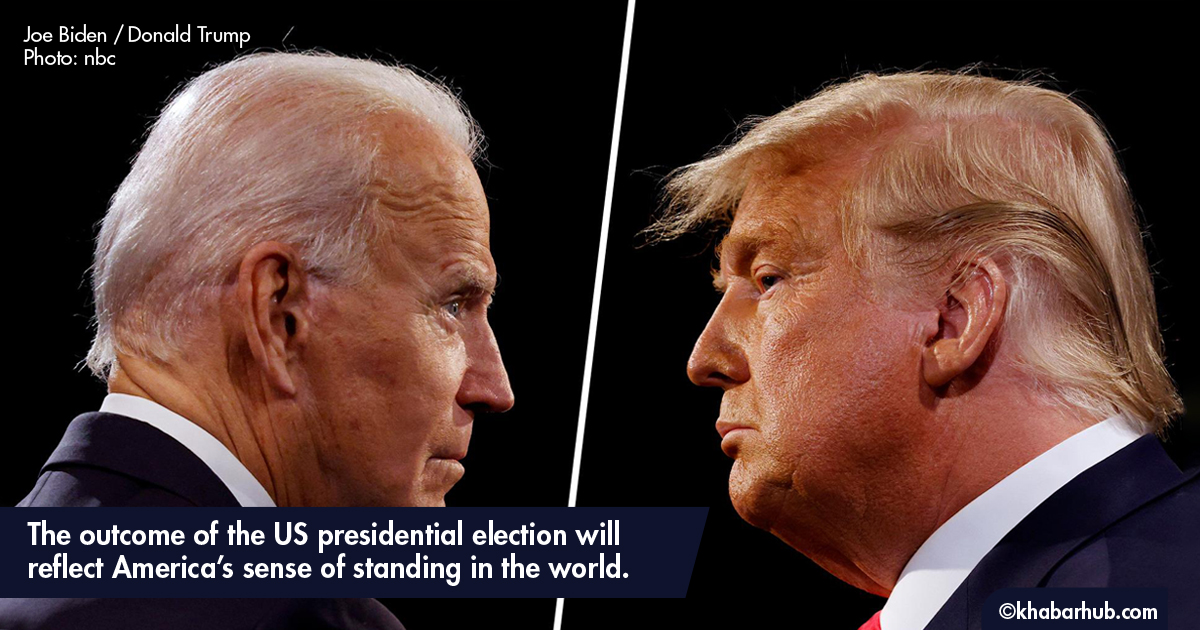The Presidential election in the United States has been a matter of policy discourse across the world.
As the US presidential election 2020 gears up to be a close race as President Donald Trump and Democratic candidate Joe Biden fight for the top post, millions of Americans will trek to the local polling stations to cast their ballots for the country’s next president on November 3.
There are just four days until the highly anticipated showdown and the candidates make their final push to win the battleground states.
Presidential candidates Trump and Biden are driving home their messages to the American voters, as a divisive political campaign nearly comes to an end.
Postal voting is underway, however, many voters are waiting until 3 November to cast their ballots.
Biden has a lead in most national polls, including an election poll released by the University of Southern California in which Biden is up 11 percentage points nationally — leading 53% to Trump’s 42%.
It is likely that the November 3 Presidential election, besides shaping the US domestic politics, will also shape its foreign policy and role globally.
On the evening of November 3, Americans and the rest of the world will settle down in front of their televisions to watch the results rolling in from across the United States.
Early in the next morning, or even that night, Americans and the world will know whether President Trump has won a second term or former Vice President Biden got elected to the top post.
The same day, a significant number of Americans will also vote in person by mail ballot or absentee, or by taking the ballot papers that they’ve filled out at home to a dropbox.
Around half (47.3%) of the ballots cast in this year’s primary season were by or by voting early in person, absentee or mail ballot. More than 48 million voters have already cast ballots as of now.
Unlike previous elections in the United States, in which voters pick the winners directly, millions of votes will not be cast for Trump or Biden. The ballots will be counted toward a statewide tally to select the electors.
Each US state will have as many electoral votes as it has senators and representatives combined — 538 in total, with 270 votes needed to win.
According to the US Federal Law, each state will have until December 8 to resolve any “contest or controversy” about the appointment of the state’s slate of electors, which gives the states more than a month after Election Day to settle the challenges or controversies to their popular votes, and certify a result and award their electoral votes.
If the states do this by what has been called the “safe harbor” date, the Congress is bound to recognize the result.
Congress, too, has a role in this. The newly elected 117th Congress will be sworn in on the 3rd of January 2021, and three days later, it will assembly in a joint session to open the electors’ ballots, count them and declare a winner to “elect” the President officially.
Impact on South Asia
Meanwhile, as the US Presidential election approaches, it is sure to make a global impact, including in South Asia amid strained relations between the US and China.
More importantly, developments surrounding trade, technology, and supply chain restrictions will be closely watched.
The Afghan peace process is one of the major developments. Likewise, the strengthening of the US-India relations in the Indo-Pacific, Pakistan-China ties vis-à-vis the US, and the India-Pakistan relations, among others are some of the complications in the role of the United States in this region.
Likewise, the issue of Hong Kong, which is emerging as a geopolitical flashpoint, will also be impacted as Asia or South Asia cannot afford to be mere spectators since the entire region is deeply connected and when the United States sneezes, the world, including Asia is sure to catch a cold.
As 2020 has posed an abundance of challenges for democracies, the US Presidential election will be seen as something more than just a fight between Trump and Biden at a time when China’s dominance in Southeast Asia has made clear in some countries such as Lao PDR, Cambodia and other countries in the region.
It is likely that the November 3 Presidential election, besides shaping the US domestic politics, will also shape its foreign policy and role globally.
The impact of the US elections will also have on the inter-regional security dynamics and its relations with South Asian countries such as India, Pakistan, and Afghanistan.
The Afghan peace process is one of the major developments. Likewise, the strengthening of the US-India relations in the Indo-Pacific, Pakistan-China ties vis-à-vis the US, and the India-Pakistan relations, among others are some of the complications in the role of the United States in this region.
The outcome of the US presidential election will reflect America’s sense of standing in the world. It will also affect how the world views the fate of the future of the United States.
(With inputs from Agencies)









Comment